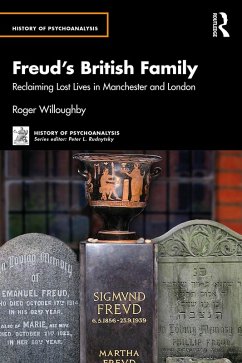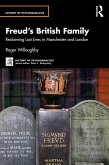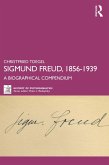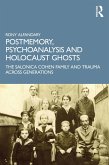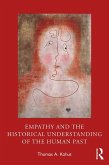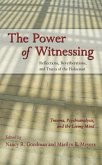Freud's British Family presents ground-breaking research into the lives of the British branch of the Freud family, their connections to the founder of psychoanalysis, and into Freud's relationship to Britain.
Dieser Download kann aus rechtlichen Gründen nur mit Rechnungsadresse in A, B, BG, CY, CZ, D, DK, EW, E, FIN, F, GR, HR, H, IRL, I, LT, L, LR, M, NL, PL, P, R, S, SLO, SK ausgeliefert werden.
"This book is the best and most detailed thing ever written about the Freud brothers who emigrated to England, their businesses and families, and their important relationship with Sigmund Freud. Roger Willoughby has devoted more than a decade to researching the British branch of the Freud family. And he has uncovered things that Freud biographers have laboured in vain to research for decades. Highly recommended!"
Christfried Tögel, editor of the Sigmund Freud Gesamtausgabe, the first complete Freud edition in 23 volumes, and author of Sigmund Freud 1856-1939: A Biographical Compendium
"A fascinating, evocative, and enlightening portrayal and study of many aspects of Freud's history not clearly laid out before. The phrase in the title 'lost lives' touches both loss and gains in the vicissitudes of Freud's history and makeup. That he would die in England on Yom Kippur a year after seeking safety in England keeps the mystery of his life open and in this book lives and character of the Freud family sparkle in depth and richness."
Michael Eigen, psychoanalyst, author of The Psychotic Core, The Mystical Psychoanalyst, Feeling Matters, and Bits of Psyche
"Willoughby has dug deep and brought us lost shadows behind Freud - and now, not so lost. No individual exists outside his context. This extensively researched history places Freud within forgotten elements of his family. His family was the setting from which the Oedipal world of early psychoanalysis sprang and which has demanded the willing and unwilling review of human nature in the twentieth century. In other words, no man is an island outside the spreading ocean of his original family. There could be no more relevant context in which to place Freud. And this book contributes a well-researched aim into the heart of psychoanalysis itself."
R D Hinshelwood, Emeritus Professor of Psychoanalysis, University of Essex, Fellow of the British Psychoanalytical Society, founder of Psychoanalysis & History, and author of A Dictionary of Kleinian Thought amongst other books
"In this very interesting book, Roger Willoughby uses newly available archives to relate the history of Freud's 'English' family in depth. Settling in Manchester, Emmanuel and Philipp Freud became importers of fancy goods - haberdashery, perfumes, trinkets, fabrics - and integrated perfectly, each in their own way, into the English Jewish bourgeoisie. Freud visited them twice, in 1875 and 1908. Willoughby hypothesizes that Freud's links with Britain materialized through his relationship with his brothers, giving rise to his Anglophilia and to his admiration for the constitutional monarchy. This attachment would partly explain why Freud chose, in 1938, to go into exile in London, city of the superego, symbol of a liberal regime conducive to the development of psychoanalysis. From a historiographical point of view, the author relies on modern principles of a study of 'minor lives' or anonymous existences, generally repressed by official history. Here is a work which testifies to the richness of studies devoted to Freud over the past twenty years."
Élisabeth Roudinesco, Head of Research in History at the Université de Paris VII-Diderot, psychoanalyst, and author of Jacques Lacan & Co and Freud: In His Time and Ours
"This outstanding study of the 'English' Freuds is long overdue. It provides detailed insight from inside Freud's family about the master's personal life as well as background to his own dreams. We encounter the great psychoanalyst in the heart of both his Austrian and English families. There is, as added bonus, a rich account of the distinguished visitors and patients seen during his last days in London."
Ross M Skelton, Professor of Philosophy and Psychoanalysis (Emeritus), Trinity College Dublin and Editor-in-Chief of The Edinburgh International Encyclopaedia of Psychoanalysis
"Biography often creates protagonist-giants trampling their contemporaries. John Freud, Sigmund's infant playmate, vanished so mysteriously from the historical record that certain fantasists could even argue Freud had killed him. In a sense Freudian historiography has done just that. By dint of intense and wide-ranging research, Roger Willoughby has finally managed to sketch John's actual story - and thus restore him to life. On a wider scale Willoughby's book maps out the web of relationships between Freud and his Manchester relatives -- his half-brothers, Emanuel and Philipp and their families. Willoughby has not only traced as much of their history as can be recuperated from the archival records, he also unearths their previously ignored influence on Freud's character and work throughout his life. What makes this research remarkable is its passion to reclaim for history neglected figures who have hitherto been treated as mute bystanders. Willoughby asserts their value and agency. The Freuds of Bloom Street, Manchester, bear comparison with Joyce's Leopold Bloom: in Willoughby's telling they are all accorded the respect due to the common man, the real 'hero' of our anti-heroic culture."
Michael Molnar, ex-Director of the Freud Museum, London, author of Looking Through Freud's Photos and editor of The Diary of Sigmund Freud 1929-1939
"Roger Willoughby has written a fascinating and absorbing narrative of Freud's 'British family', and its enduring presence in his life and work. Freud's British Family holds the promise of deepening our appreciation of how Freud's psychoanalytic thought reflected his lived experiences with the Freud 'families' he came to know in Manchester, Vienna, and Freiberg. In focusing on Freud's British family, the author has made a genuinely new contribution to Freud biography and the historiography of psychoanalysis."
Nellie L. Thompson, New York Psychoanalytic Society and Institute, editor of 100 Years of the IPA: The Centenary History and Play, Gender, Therapy: Selected Papers of Eleanor Galenson
Christfried Tögel, editor of the Sigmund Freud Gesamtausgabe, the first complete Freud edition in 23 volumes, and author of Sigmund Freud 1856-1939: A Biographical Compendium
"A fascinating, evocative, and enlightening portrayal and study of many aspects of Freud's history not clearly laid out before. The phrase in the title 'lost lives' touches both loss and gains in the vicissitudes of Freud's history and makeup. That he would die in England on Yom Kippur a year after seeking safety in England keeps the mystery of his life open and in this book lives and character of the Freud family sparkle in depth and richness."
Michael Eigen, psychoanalyst, author of The Psychotic Core, The Mystical Psychoanalyst, Feeling Matters, and Bits of Psyche
"Willoughby has dug deep and brought us lost shadows behind Freud - and now, not so lost. No individual exists outside his context. This extensively researched history places Freud within forgotten elements of his family. His family was the setting from which the Oedipal world of early psychoanalysis sprang and which has demanded the willing and unwilling review of human nature in the twentieth century. In other words, no man is an island outside the spreading ocean of his original family. There could be no more relevant context in which to place Freud. And this book contributes a well-researched aim into the heart of psychoanalysis itself."
R D Hinshelwood, Emeritus Professor of Psychoanalysis, University of Essex, Fellow of the British Psychoanalytical Society, founder of Psychoanalysis & History, and author of A Dictionary of Kleinian Thought amongst other books
"In this very interesting book, Roger Willoughby uses newly available archives to relate the history of Freud's 'English' family in depth. Settling in Manchester, Emmanuel and Philipp Freud became importers of fancy goods - haberdashery, perfumes, trinkets, fabrics - and integrated perfectly, each in their own way, into the English Jewish bourgeoisie. Freud visited them twice, in 1875 and 1908. Willoughby hypothesizes that Freud's links with Britain materialized through his relationship with his brothers, giving rise to his Anglophilia and to his admiration for the constitutional monarchy. This attachment would partly explain why Freud chose, in 1938, to go into exile in London, city of the superego, symbol of a liberal regime conducive to the development of psychoanalysis. From a historiographical point of view, the author relies on modern principles of a study of 'minor lives' or anonymous existences, generally repressed by official history. Here is a work which testifies to the richness of studies devoted to Freud over the past twenty years."
Élisabeth Roudinesco, Head of Research in History at the Université de Paris VII-Diderot, psychoanalyst, and author of Jacques Lacan & Co and Freud: In His Time and Ours
"This outstanding study of the 'English' Freuds is long overdue. It provides detailed insight from inside Freud's family about the master's personal life as well as background to his own dreams. We encounter the great psychoanalyst in the heart of both his Austrian and English families. There is, as added bonus, a rich account of the distinguished visitors and patients seen during his last days in London."
Ross M Skelton, Professor of Philosophy and Psychoanalysis (Emeritus), Trinity College Dublin and Editor-in-Chief of The Edinburgh International Encyclopaedia of Psychoanalysis
"Biography often creates protagonist-giants trampling their contemporaries. John Freud, Sigmund's infant playmate, vanished so mysteriously from the historical record that certain fantasists could even argue Freud had killed him. In a sense Freudian historiography has done just that. By dint of intense and wide-ranging research, Roger Willoughby has finally managed to sketch John's actual story - and thus restore him to life. On a wider scale Willoughby's book maps out the web of relationships between Freud and his Manchester relatives -- his half-brothers, Emanuel and Philipp and their families. Willoughby has not only traced as much of their history as can be recuperated from the archival records, he also unearths their previously ignored influence on Freud's character and work throughout his life. What makes this research remarkable is its passion to reclaim for history neglected figures who have hitherto been treated as mute bystanders. Willoughby asserts their value and agency. The Freuds of Bloom Street, Manchester, bear comparison with Joyce's Leopold Bloom: in Willoughby's telling they are all accorded the respect due to the common man, the real 'hero' of our anti-heroic culture."
Michael Molnar, ex-Director of the Freud Museum, London, author of Looking Through Freud's Photos and editor of The Diary of Sigmund Freud 1929-1939
"Roger Willoughby has written a fascinating and absorbing narrative of Freud's 'British family', and its enduring presence in his life and work. Freud's British Family holds the promise of deepening our appreciation of how Freud's psychoanalytic thought reflected his lived experiences with the Freud 'families' he came to know in Manchester, Vienna, and Freiberg. In focusing on Freud's British family, the author has made a genuinely new contribution to Freud biography and the historiography of psychoanalysis."
Nellie L. Thompson, New York Psychoanalytic Society and Institute, editor of 100 Years of the IPA: The Centenary History and Play, Gender, Therapy: Selected Papers of Eleanor Galenson

